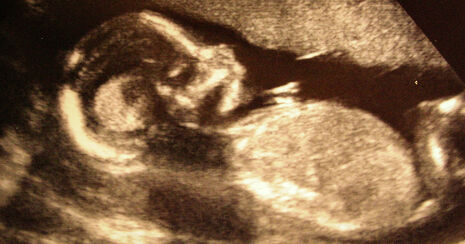Book: Nutshell
Ian McEwan’s latest offering is a biazarre yet masterful retelling of a classic, from a rather different perspective, says Cornelius Dieckmann

Nutshell is a novel of filial love, murderous conspiracy, and comedic tragedy. But first and foremost it is a story told from a wonderfully weird perspective.
“So here I am, upside down in a woman.”
Thus the nameless narrator of Ian McEwan’s new book Nutshell introduces himself to the yet unknowing reader, who quickly realises they are being granted an extensive glimpse into life before life, as told by a foetus in his last weeks before birth. But even in utero, something is rotten: before baby must leave the cosy abode of his mother Trudy’s womb, he overhears that she is having an affair with his uncle, Claude. Worse still, Trudy and Claude are plotting to kill baby’s father, John, in cold blood!
Trudy? Claude? A near-incestuous affair and spousal homicide? Sound familiar? That’s because the novel is an ingenious retelling of Hamlet. Transferred from medieval Denmark to present-day London, it lends modern clothes to Shakespeare’s best-known play, blows some dust off the Elizabethan tale, and invigorates it with an absurd kind of black humour which – oddly enough – works.
This not least because baby Hamlet is not your usual, blissfully ignorant minus-one-month-old. Through eavesdropping on outside talk and avid listening in on Trudy’s radio news and internet podcasts, he has become quite the intellectual. He can give a short lecture on Russian-Ukrainian relations, is acquainted with Roland Barthes’ The Pleasure of the Text, knows Schönberg from Schubert, and is, rather tragically by way of Trudy’s drinking habits, a respectable wine connoisseur.
But as over-the-top as this all may sound, the novel’s general tongue-in-cheek attitude never slips into silliness. There are moments of earnestness that give the story weight at the right times. What does it mean for a son to be torn between the instinctual love for his mother and disgust at her deeds? When does one leave the land of innocence and enter that of worldly experience? What portion of a person’s life is determined even before his or her official personhood is reached? To be or not to be?
This, McEwan’s fourteenth novel, proves once again that he is a writer finely attuned to how the heart beats. He knows how to make his reader feel entertained, happy, and sad, all within twenty pages – an expert in the craft of the sad smile, so to speak. There is a certain tenderness with which his characters come to life (literally, in this case) and yet he manages to steer clear of kitsch. The feat of successfully maintaining the curious point of view while also playing around with a text as eminent as Hamlet could only be pulled off by a masterful stylist. McEwan is one.
If you’re looking to get into his books or if you’ve been scouting the bookshop displays for a quick read to squeeze in before term begins, Nutshell can only be recommended. Or maybe you didn’t enjoy Hamlet, forced to read it by your English teacher when you were sixteen and never particularly cared for the cryptic play within the play, the power games of long-gone Danish royals, and the melodramatic discourse upon one inexplicably famous skull. Be assured – you don’t have to be a fan of the play to read this novel; it is a pleasure in its own right.
“Help, angels! Make assay!” So cries the guilt-ridden Claudius in Hamlet’s act 3, scene 3. “Bow, stubborn knees, and heart with strings of steel, / Be soft as sinews of the new-born babe. / All may be well.”
Will all be well in Nutshell? See for yourself.
 News / SU reluctantly registers controversial women’s soc18 December 2025
News / SU reluctantly registers controversial women’s soc18 December 2025 News / CUP announces funding scheme for under-represented academics19 December 2025
News / CUP announces funding scheme for under-represented academics19 December 2025 Features / Should I stay or should I go? Cambridge students and alumni reflect on how their memories stay with them15 December 2025
Features / Should I stay or should I go? Cambridge students and alumni reflect on how their memories stay with them15 December 2025 Fashion / The art of the formal outfit 18 December 2025
Fashion / The art of the formal outfit 18 December 2025 Lifestyle / Summer lovin’ had me so… lonely?18 December 2025
Lifestyle / Summer lovin’ had me so… lonely?18 December 2025








